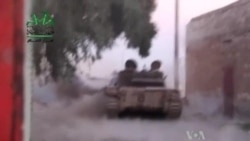WASHINGTON —
The Obama administration appears to be rethinking options regarding the civil war in Syria following a deadlock in peace talks, the rapidly growing death toll, and the expansion of the massive humanitarian crisis.
The bombings in Syria continue.
The civil war is grinding into its third year.
The moderate opposition to the Assad government is weaker.
“What has happened is that Assad and Hezbollah are winning and the al-Qaida affiliates are becoming stronger within the insurgency," said Michael O’Hanlon, who is with the Brookings Institution. "So our current policy is failing to prevent the very outcomes that we most fear.”
Analysts say the strength of groups inspired by al-Qaida is actually helping Syrian President Bashar al-Assad, who calls all the rebels terrorists.
“The narrative that is prevailing today is that this is a fight between the Assad regime and al-Qaida," said Mideast analyst David Schenker, a Middle East analyst at The Washington Institute. "And therefore the United States, the Obama administration, has taken this ambivalent position.”
The conflict has killed more than 135,000 people and has driven more than nine million from their homes.
The U.S. hoped the peace talks in Geneva would bring a breakthrough, but the latest round ended in deadlock.
"It is very clear that Bashar al-Assad is continuing to try to win this in the battlefield rather than to come to the negotiating table in good faith," said U.S. Secretary of State John Kerry.
Syrian military pilots are dropping barrel bombs on civilian populations. This has so terrified people in recent weeks that a half-million have fled their neighborhoods.
Analysts say the Obama administration could provide intelligence on the pilots to help the rebels stop the carnage.
“We don’t see so many fixed wing aircraft flying around Syria anymore because most of the pilots have defected," said David Schenker. "We have got to work on this with the remaining helicopter pilots either by convincing them to leave or by helping the rebels to better target them.”
Analysts also say the U.S. and its allies can still build the moderate Free Syrian Army (FSA) into an effective force.
They say the FSA could be supplied with anti-tank weapons, better ammunition and cash to pay fighters.
The CIA could also expand its modest rebel training program in Jordan.
However, officials say President Barack Obama remains skeptical about any step that could draw the U.S. into the war.
“History would suggest that Obama does not want to play any major role in this war," Michael O’Hanlon said. "And he prefers to ignore it for as long and as often and as much as he can.”
Short of military force, it's not clear how Washington can change the course of the war, in which Syria's government is supported by Iran and Russia.
The bombings in Syria continue.
The civil war is grinding into its third year.
The moderate opposition to the Assad government is weaker.
“What has happened is that Assad and Hezbollah are winning and the al-Qaida affiliates are becoming stronger within the insurgency," said Michael O’Hanlon, who is with the Brookings Institution. "So our current policy is failing to prevent the very outcomes that we most fear.”
Analysts say the strength of groups inspired by al-Qaida is actually helping Syrian President Bashar al-Assad, who calls all the rebels terrorists.
“The narrative that is prevailing today is that this is a fight between the Assad regime and al-Qaida," said Mideast analyst David Schenker, a Middle East analyst at The Washington Institute. "And therefore the United States, the Obama administration, has taken this ambivalent position.”
The conflict has killed more than 135,000 people and has driven more than nine million from their homes.
The U.S. hoped the peace talks in Geneva would bring a breakthrough, but the latest round ended in deadlock.
"It is very clear that Bashar al-Assad is continuing to try to win this in the battlefield rather than to come to the negotiating table in good faith," said U.S. Secretary of State John Kerry.
Syrian military pilots are dropping barrel bombs on civilian populations. This has so terrified people in recent weeks that a half-million have fled their neighborhoods.
Analysts say the Obama administration could provide intelligence on the pilots to help the rebels stop the carnage.
“We don’t see so many fixed wing aircraft flying around Syria anymore because most of the pilots have defected," said David Schenker. "We have got to work on this with the remaining helicopter pilots either by convincing them to leave or by helping the rebels to better target them.”
Analysts also say the U.S. and its allies can still build the moderate Free Syrian Army (FSA) into an effective force.
They say the FSA could be supplied with anti-tank weapons, better ammunition and cash to pay fighters.
The CIA could also expand its modest rebel training program in Jordan.
However, officials say President Barack Obama remains skeptical about any step that could draw the U.S. into the war.
“History would suggest that Obama does not want to play any major role in this war," Michael O’Hanlon said. "And he prefers to ignore it for as long and as often and as much as he can.”
Short of military force, it's not clear how Washington can change the course of the war, in which Syria's government is supported by Iran and Russia.





